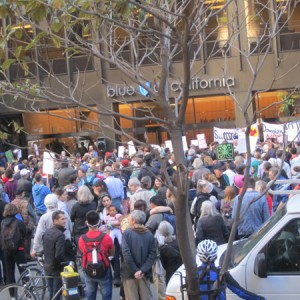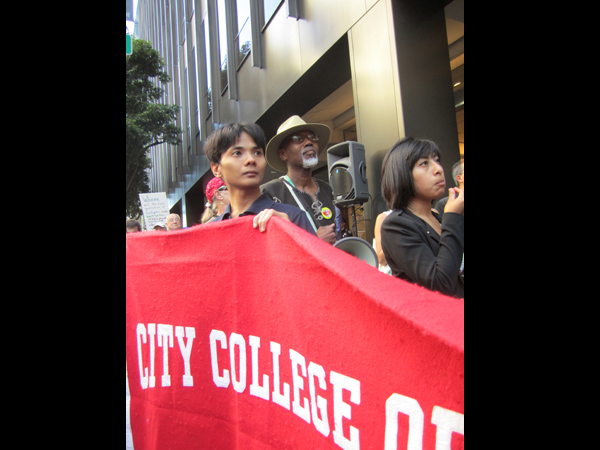
SF Community College students, employees and supporters rally in front of the US Department of Education against recommendation to shut down the school.
SAN FRANCISCO—Hundreds of students, teachers and school employees of the City College of San Francisco (CCSF), including Filipinos, held a rally in front of the US Department of Education, calling for more scrutiny of an accreditation agency that recommended the shutdown of the largest junior community college in the US.
“Public good before profit!” chanted protesters, who are fighting to keep the CCSF open, despite a projected financial loss of some $2.5 million next year. The Accrediting Commission for Community and Junior Colleges (ACCJC) last week said it would no longer accredit CCSF after July next year.
Without accreditation, academic credits from CCSF would not be transferrable to other schools, nor would students be able to obtain federal student loans or grants. The agency cited 14 reasons for stripping CCSF of its accreditation, but “lack of financial accountability, as well as institutional deficiencies in the area of leadership and governance” were the main reasons for its decision.
Impact on Filipinos
“Mahirap magbayad ng tuition. Mura dito at maganda naman ang mga course (Tuition is expensive. But here it’s cheaper yet the courses are good),” said Filipino immigrant student Michael Reyes, who was at the rally. “Kailangan ito para makahanap ng magandang trabaho (We need this to find good jobs).”
Reyes, originally from Quezon City, is taking a certification course and is just one of thousands of Filipino students enrolled in CCSF. Last school year, some six percent of the 51,209 students enrolled in courses for academic credit identified themselves as Filipino.
But enrollment of Filipino students at CCSF has been on the decline over the last 10 years, according to the college’s own study of internal and external trends. Among all races, enrolment of whites and Asians showed the most decreases. The study cited state budget cuts and, as a result, fewer classes being offered, as the main reasons for decreased overall student enrollment.
“Even if there’s a decline, there is still a significant number of Filipinos of some (estimated) 85,000 students now enrolled,” said Rodel Rodis, who served on CCSF’s board of trustees for 18 years, and was board president for three terms.
“You’re looking at people who don’t have a chance to go to college. We’re talking about common working people who even with two jobs cannot afford Berkeley or the Ivy Leagues,” said Rodis, explaining the potential impact of CCSF on Filipino Americans.
Appeal planned
Protesters call for investigation of accreditation agency that recommended the closure of the community college.
CCSF officials plan to appeal the ACCJC’s decision. The teachers’ union struck back at the accrediting agency, by filing a complaint against it last April that could affect ACCJC’s standing with the US Department of Education. The complaint alleges conflicts of interest within the agency, and suggests abuse of its authority.
Since CCSF received a warning from the accrediting body last year, college officials had taken steps to address problematic issues, including cutting back staff and winning support from taxpayers.
But it is still the expected $2.5 million loss next year, according to a forecast by California state’s Fiscal Crisis and Management Assistance Team, that remains CCSF’s biggest obstacle to continued accreditation.
At the rally, a number of San Francisco city supervisors said the city should come to CCSF’s rescue. “Just $2.5 million to save CCSF, when the city spends, what? Twenty million to build bike lanes?” said Rodis.
“For every person who gets a college degree, the doors just open. You close down City College, and you close those doors,” Rodis said.


